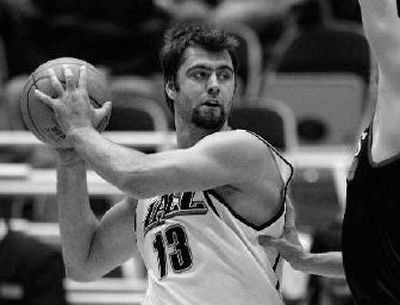Steady Okur always comes to play for Jazz

SALT LAKE CITY – When the Utah Jazz signed Mehmet Okur as a free agent in 2004, the deal was overshadowed by the arrival of Carlos Boozer.
But Okur has been the most durable player on Utah’s roster, and his clutch outside shooting has helped keep the Jazz atop the Northwest Division. His play has also eased the loss of leading scorer and rebounder Boozer, who has a broken leg.
In close games, the Jazz are comfortable getting the ball inside or even outside to their 6-foot-11 sharpshooter.
“I have confidence in my shots. So do my teammates and coach,” Okur said. “If they need me, I’ll be there for them.”
Okur is the top 3-point shooter on the Jazz at 38 percent. He’s also second on the team from the foul line, and second only to Boozer in scoring as Utah appears headed back to the playoffs for the first time in four years.
“There’s not many guys 6-11, 7-foot that can shoot like that,” Jazz point guard Deron Williams said. “It comes at the right time as well. He likes those clutch shots.”
Utah lost Boozer, who has been averaging 22 points and 12 rebounds, at the end of January when he broke a bone in his left leg. But Okur rallied the Jazz to three wins in their next four games.
He scored 29 and hit a game-winning shot with 5 seconds left in a win at Phoenix. Then he scored 12 of Utah’s last 14 points in a 100-95 win over Chicago.
Okur scored 31 against the Spurs on Jan. 31, going 10 for 14 from the field and 3 of 6 from 3-point range in a 97-93 victory. Okur scored eight in the fourth quarter, including a 3-pointer with 27 seconds left that gave the Jazz the lead for good.
The 3-pointers have been fan favorites, and Okur is trying to adapt to being called “Money” for his clutch shooting.
Boozer is expected back by late February or early March. When Boozer returns, Okur will move back to center and once again give Utah the combination the team envisioned when both players signed as free agents in 2004.
Okur’s run with the Jazz is all the more remarkable considering his arrival in 2004, when Sloan was not pleased to see a somewhat stouter version of his new center. After winning the NBA title with the Pistons, Okur got married and signed a six-year, $50 million deal with the Jazz.
He lived a little too comfortably that summer and paid for it right away once practice started.
“The people say get in your shape because you’re going to need it, especially with Jerry,” Okur said. “I thought I was in shape, but as soon as I saw what we were doing out there, a lot of running stuff, ‘Uh oh, I’m in trouble.’ “
Okur started just 25 games that first season, even though the Jazz were short-handed through much of it because of injuries. Okur was still the only member of the Jazz to play in all 82 games that season.
Sloan’s message registered and Okur came back in better shape.
Growing up in Turkey, Okur wanted to be a soccer player. But when he grew to taller than 6 feet by age 14, it was apparent he might have a better future in basketball. His family persuaded him to try it.